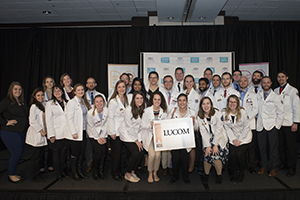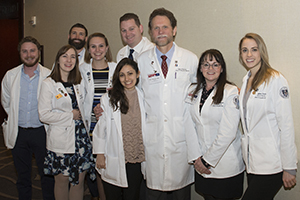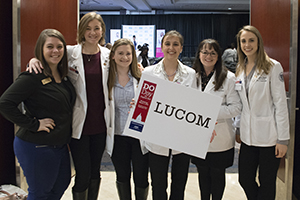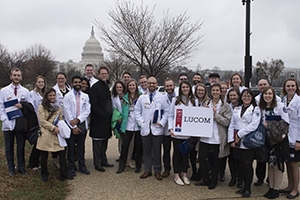Friday, March 9, 2018
Advocating for the Osteopathic profession, student-doctors march on the Hill
Fri, 09 Mar 2018Asa Keimig | LUCOM Marketing
 Student-Doctors from Liberty University College of Osteopathic Medicine (LUCOM) traveled to Washington, D.C., to participate in DO Day on Capitol Hill, hosted by the American Osteopathic Association (AOA), on March 7. Representing the Osteopathic profession, they met with legislators to advocate for the Good Samaritan Act and to protect accessibility of student loan programs that are a part of the Higher Education Act.
Student-Doctors from Liberty University College of Osteopathic Medicine (LUCOM) traveled to Washington, D.C., to participate in DO Day on Capitol Hill, hosted by the American Osteopathic Association (AOA), on March 7. Representing the Osteopathic profession, they met with legislators to advocate for the Good Samaritan Act and to protect accessibility of student loan programs that are a part of the Higher Education Act.
DO Day on Capitol Hill is an event organized annually by the AOA and a venue through which hundreds of osteopathic medical professionals are able to meet with US senators and members of Congress to advocate for healthcare legislation. “I genuinely believe that we as future physicians, alongside of current physicians, have the humanitarian duty to advocate for our patients on the political front to provide them with quality and affordable healthcare,” said Krishna Patel, Class of 2020. “This platform allows us to educate politicians on the osteopathic medical profession, its true value to patients and the underserved while bringing light to issues currently affecting our communities.” Patel believes that advocacy can make a true impact and that she is an integral part in making real change. “Healthcare legislation affects every American, but only a small percentage of the population are part of the conversation. DO Day allows us to build a bridge between the patient communities and healthcare subcommittees on the hill,” she said.
 As a medical student, Patel can see the bigger picture and believes that the practice of medicine extends beyond a fifteen-minute consultation. “The practice of medicine is borderless and I hope to continue advocating for healthcare for Americans, both now as a medical student and later as a physician,” said Patel. “To see change, you have to be willing to fight for change.”
As a medical student, Patel can see the bigger picture and believes that the practice of medicine extends beyond a fifteen-minute consultation. “The practice of medicine is borderless and I hope to continue advocating for healthcare for Americans, both now as a medical student and later as a physician,” said Patel. “To see change, you have to be willing to fight for change.”
LUCOM was represented in Washington by 28 student-doctors from each of the current classes, all with a passion to have their voices heard. They were passionate about advocating for their future profession but also for the proper availability of medical care. “I’ve been advocating for the osteopathic profession on Capitol Hill for eighteen years and it has always been important to make your voice heard, especially as a member of this profession,” said LUCOM Dean Peter A. Bell, DO. “Representatives were attentive and interested in what had to be said as student-doctors educated them on pieces of legislation that would have a significant impact on not only the development of osteopathic physicians across the country but also the availability of health care during a time of need.”
 After a morning briefing session with the AOA discussing key health care initiates, students and Osteopathic physicians collectively marched to Capitol Hill to meet with senators, state representatives, and legislative aids. The March was organized to raise awareness of the Osteopathic profession to those outside of the medical field.
After a morning briefing session with the AOA discussing key health care initiates, students and Osteopathic physicians collectively marched to Capitol Hill to meet with senators, state representatives, and legislative aids. The March was organized to raise awareness of the Osteopathic profession to those outside of the medical field.
There were two pieces of legislation that medical students and physicians alike were lobbying for on Capitol Hill. The Good Samaritan Health Professionals Act and the Higher Education Act.
Good Samaritan Health Professionals Act
Action: Cosponsor
Issue
Over the past year, large-scale disasters including the wildfires of California and the hurricanes and subsequent flooding of Texas, the Gulf Coast and Puerto Rico. These events highlight the need to ensure that medical professionals who seek to lend their expertise and assistant to victims of these natural disasters are not turned away or limited in the scope of their assistance because of the threat of medical liability lawsuits.
Solution
The Good Samaritan Health Professionals Act of 2017 (H.R. 1876/S. 781) would protect medical volunteers from lawsuits during a federally-declared disaster and ensure that vital health care services often provided by medical volunteers remain available, creating a more comprehensive and clear approach to medical volunteerism during a federally-declared disaster.
Medical Student Access to Student Loan Programs in the Higher Education Act
Action: Protect
Issue
The Higher Education Act authorizes numerous federal aid programs that provide support to medical students pursing a postsecondary education at institutions of higher education including osteopathic medical school. Since the Act’s last reauthorization in 2008, there has been an increase in the number of medical students entering osteopathic medical schools across the country. A recent report by the American Osteopathic Association found that one in five medical students in the U.S. attends an osteopathic medical school, with enrollment increasing approximately 25% every five years. Many osteopathic medical students often take out a significant amount of student loans to finance their medical education and are faced with significant student loan debt upon graduation. Osteopathic students around the nation have relied on financial aid and loan repayment programs through eh Higher Education Act (HEA) to finance their education.
Solution
The reauthorization of the Higher Education Act along with the Public Service Loan Forgiveness (PSLF) Program, Federal Direct Graduate PLUS and Perkins Loans programs would ensure that osteopathic medical students would have access to the funding they need to complete their medical education. Failure to reauthorize these vital programs would lead to higher interest rates for medical student borrowers and make medical school less affordable.
 “I was inspired to continue advocating for the osteopathic profession after being a part of DO Day on Capitol Hill last year,” said Yevgeniy Luts, Class of 2020. “Having come from an underprivileged background myself, government loans have been vital to my education and have allowed me to pursue a career in medicine. Without continued funding, the opportunity to attend graduate school is not there, so it is absolutely vital to advocate for programs that many osteopathic students depend on.”
“I was inspired to continue advocating for the osteopathic profession after being a part of DO Day on Capitol Hill last year,” said Yevgeniy Luts, Class of 2020. “Having come from an underprivileged background myself, government loans have been vital to my education and have allowed me to pursue a career in medicine. Without continued funding, the opportunity to attend graduate school is not there, so it is absolutely vital to advocate for programs that many osteopathic students depend on.”
DO Day on Capitol Hill in 2017 taught Luts about the power of advocacy. He has since become very active in letter writing campaigns on behalf of the Osteopathic profession in addition to petitioning his state senators and representatives to continue protecting patient rights and access to healthcare. Through his involvement with LUCOM-Student Osteopathic Medical Association (SOMA), he has been able to inspire his classmates to be more politically active and engaged in these important topics.
Through his political engagement, Luts was recognized by the Omega Beta Iota National Osteopathic Political Action Honor Society and was recently elected to a position on the national board. “I believe every Osteopathic student has a role in advocacy,” he said. “Together, we can make a difference.”
View a complete gallery of images at Facebook.com/LibertyMedicine.